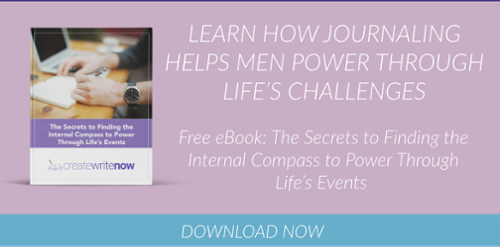Men have perhaps never been so unsure of themselves as they are today. Definitions of what it means to be a man have been turned upside-down. The #MeToo movement has made even decent, respectful men nervous about their interactions with women. There’s a growing number of willing and happy stay-at-home dads threatening the ancient norm of men as the primary breadwinner and more households in which the wife earns more than the husband.
Countless studies point to a silent modern-man crisis of epic proportions. Schoolboys who are more likely to suffer from ADD than girls. Rampant depression that’s now the biggest killer of men under 30. Young men so lost they swell the ranks of male-dominated white supremacist groups. Introverts who troll women on social media and have lost their confidence -- and even ability -- to talk face-to-face with them.
For large numbers of guys, the world has gone crazy and they don’t know what to do or even who to be. In short, many men are simply lost. This has been attributed to a variety of factors, including the massive decline in traditional male industries such as manufacturing, leaving large swathes of men in some regions unemployed or underemployed, with no real purpose in life. For others, it may be perceived (or real) rejection from mainstream society, leading to strong feelings of alienation and isolation.

If you’re a man struggling with who you are and who you want to be in this rapidly-changing world, becoming self-aware is a crucial step in coming to grips with your personal identity -- and journaling can help.
Without self-awareness, our thoughts, feelings, and behavioral patterns are controlled entirely by unconscious beliefs, assumptions, and instincts. When we lack self-awareness, we create our own uncertainty and confusion, which can have an impact on our relationships with others. However, when we learn to become conscious of our subliminal thoughts, beliefs, ideals, assumptions, and choices, we become more peaceful, self-assured, and accepting because we’re gaining a clearer understanding of who we are and how we got this way.
There are plenty of men who would quickly say, “Well, I certainly know who I am. I’m a (fill in job title), who’s (marital/family status), and like to (fill in sports/hobbies/other activities).” While this may describe you superficially, it doesn’t really address who you really are as a person. There’s a good chance you lack self-awareness if you can identify with the following indicators:
- You have a hard time understanding what you are feeling
- You find it difficult to speak about your feelings and thoughts with others
- You are constantly lost in your thoughts
- You are frequently upset by others
- You have low self-esteem
- You have a very weak sense of self, or you have a very rigid, fragile identity
If you find that you really don’t have a clear picture of who you are deep down inside, open to a blank journal page and start to do a little quiet reflection using the three following exercises:
Quiet yourself Often we use “busyness” as a way of escaping the things that cause us pain, embarrassment, or anger in our everyday lives. We feel the need to “do something” and stay active as a distraction; however, the best way to truly experience and appreciate – or challenge -- who we are is to be still and look inward.
To develop true self-awareness it’s imperative that you begin with an “empty page” (literally and figuratively), and quiet solitude is the best place to start. This is because solitude grounds you in reality, and although it can be daunting at first, spending time alone with your journal each day provides you the opportunity to reflect on yourself, what you have done, what you have said, what you feel, and what you would like to do. Solitude realigns us with who we really are and so is a perfect conduit of self-awareness.
Meditate This is the next step after quieting yourself. First, it’s important to learn that you don’t have to be “busy” all the time, then you can progress to slowing yourself down internally and develop a keener sense of “mindfulness” – of being aware of the present and fully living in the moment. Focusing inward helps you to become more conscious of the inner chatter within you that often goes unnoticed.
Use your journal as a guide to your personal identity Recording all of your thoughts in a safe and secure place helps you to not only track your self-growth progress, but this practice also helps you to be more authentic with yourself. When you are honest with yourself about your thoughts and feelings and express them in your journal, they no longer stay bottled up. Writing your thoughts down gives you an opportunity to explore and reflect on what you truly think and feel, and what you can do to feel better or remedy certain issues.
When you achieve self-awareness, you are better equipped to gain insight into the three major elements of personal identity:
- Physical health
It’s important to stress that personal identity is more than just self-awareness. Understanding your physical health is important for any man because feeling physically confident is central to manhood. Not having medical issues minimizes the crises that can occur and derail your life plan. Journaling helps men explore the things they are doing that impair their health, such as poor diet and lack of exercise, and those that are improving their health
- Emotional health
As we’ve discussed in previous posts, journaling is a highly effective way for men to explore their emotions. We talk about men having trouble with the “F-word” -- Feelings. Journaling enables them to explore their feelings in a private, safe, and personal way. By getting in touch with their emotions and understanding them in context to their personal identity, men can relate better to others and both solidify and improve their relationships at home and at work.
- Spiritual health
Whether you’re religious or not, spiritual health is important for everyone, including men. It is an expansion of emotional health because spirituality – whether it’s a belief in God or the power of Mother Nature – helps us understand our place in the world and adds meaning to our lives, which can help us emotionally.
Insight can only be achieved by understanding, which results from reflection. By using the techniques outlined in this post to gain a better understanding of the three major elements of your personality, you’ll come to know yourself more completely and have confidence in your personal identity.
Do you need help understanding your personal identity? Learn how to understand your personality and enrich your life by downloading the eBook titled "The Secrets to Finding the Internal Compass to Power through Life's Events."



Leave Comment